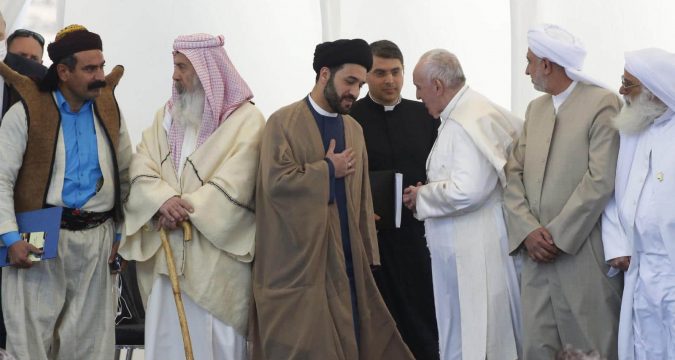
HONG KONG (SE/Agencies): Nine years ago, on 13 March 2013, Jesuit Archbishop Jorge Mario Bergoglio from Argentina, surprised the world when he was elected as the first pope from the Americas. That was only the beginning of the surprises. He chose the name ‘Francis,’ ascertaining his commitment and option towards the poor. He bowed his head and asked the people to pray for him as he began to lead with humble ways, powerful words, and a call to live out the joy of the gospel.
“If there is one feature that has become increasingly clear in nine years of Pope Francis’ pontificate, it is precisely his tireless commitment to building bridges in order to unite where there is division, to cross those visible and sometimes invisible barriers of separation that prevent encounter,” wrote Alessandro Gisotti, reporting for Vatican News.
The pope has worked hard to build bridges between peoples and cultures, and between religious and political leaders with an intensity and sense of urgency that have grown as he has witnessed walls erected following the end of the Cold War and growing division in the world.
Despite his persistent efforts, even forgoing protocols to go to the Russian Embassy in Rome, when Russia unleashed its army on Ukraine, the pope braved his knee problems and stood at that window of his residence and said: “Those who wage war forget humanity. Put down your weapons. God is with the peacemakers.”
‘If there is one feature that has become increasingly clear in nine years of Pope Francis’ pontificate, it is precisely his tireless commitment to building bridges in order to unite where there is division, to cross those visible and sometimes invisible barriers of separation that prevent encounter’
Alessandro Gisotti, Vatican News
While addressing the diplomatic corps—an audience with the ambassadors accredited to the Holy See—on January 10, Pope Francis reiterated that dialogue and cooperation between peoples are stages along a path we cannot avoid if we really want to prepare a future of hope for future generations. “We should be unafraid to make room for peace in our lives by cultivating dialogue and fraternity among one another.”
The intense concern for women and men who are wounded, discarded, humiliated is what matters the most to the pope, and he bears witness with words and gestures, following in the footsteps of his predecessors and developing the Magisterium with simplicity and love. In the process, he reminds the Church of its responsibility towards the world.
The “impossible” journey to Iraq is regarded as the most extraordinary example of this effort by the pope. It was a trip that many had advised against, but which proved to be a powerful, prophetic message in favour of peace and fraternity.
As part of the initiative of Catholic Social Thought and Public Life, Georgetown University in the United States organised a public dialogue on the “Francis Factor,” analysing his leadership, priorities, challenges, and impact. The theme of the dialogue held on March 1 was The Francis Factor at Nine Years: Synodality and Solidarity, Reform and Resistance.
One of the panellists, Sister Alessandra Smerilli, a member of the Daughters of Mary Help of Christians and interim secretary of the Vatican Dicastery for Promoting Integral Human Development, commented that “Pope Francis understands what it means to listen. By his example, he encourages all of us to listen with an open heart. He teaches the world to listen to one another without prejudice and to listen to our common home as it is an essential pillar in building a world of peace, care, and love.”
…focus on the things that bring us together. He helps us to be one Church, one people, one world that is united, that cares for one another …We must listen to each other so that we can walk together’
Sister Norma Pimentel
“Sister Smerilli said, “It is through dialogue and listening that we come to understand the complexities of the issues facing humanity, from the perspectives of those who suffer the most. We see in Jesus, becoming one of us in order to heal, to save, to express the love of God.”
She added, “It is through listening, acknowledging suffering but also opportunities and potential for change that we can find hope. Having hope and recognising each other will motivate us to take the first step towards integral and collaborative actions. So in a word, he is teaching us how to listen, and we are trying to do this.”
Kim Daniels, co-director of the Initiative on Catholic Social Thought and Public Life, spoke of how the 2023 synod on synodality fits in with Pope Francis’ penchant for listening. “Here you have the world’s oldest institution widely seen as stuck in the past, beset with problems, is embarking on something new and unprecedented. This global listening process, open to everyone with the goal of living out our mission, set most of all on humble service to those lying wounded on the roadside.”
Daniels said, “This is a call to each of us, especially laypeople,” adding, “It is calling us to greater participation and living out our mission of loving God and one another.”
Sister Norma Pimentel, a member of the Missionaries of Jesus, who is executive director of Catholic Charities of the Rio Grande Valley in the Diocese of Brownsville, Texas, said Pope Francis is “helps us to recognise that we must let go of everything that stops us from reaching out and being present to the other.”
Pimentel said it does Church’s members good to “focus on the things that bring us together. He helps us to be one Church, one people, one world that is united, that cares for one another,” she said. “We must listen to each other so that we can walk together.”








